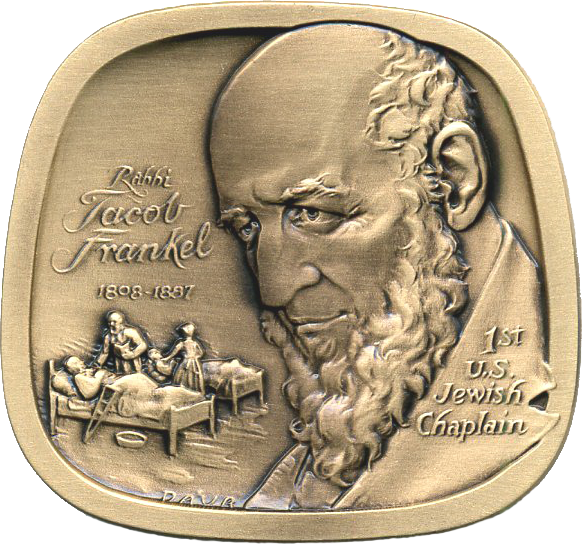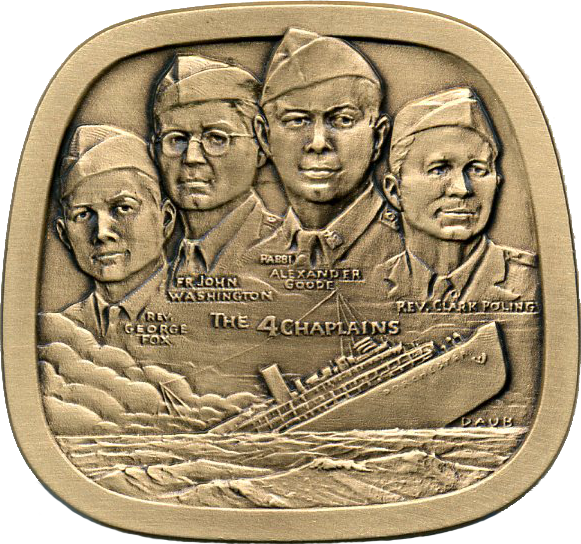 |  |
Jewish Chaplains medal designed by Eugene Daub, struck by Medalcraft Mint in quantities of
125 bronze, 65 pure silver, and 27 gold-plated silver. Obverse: Portrait, Rabbi Jacob Frankel
1808-1887, 1st U.S. Jewish Chaplain, DAUB. Reverse: Portraits and sinking troop ship SS Dorchester,
THE 4 CHAPLAINS, REV. GEORGE FOX, FR. JOHN P. WASHINGTON, RABBI ALEXANDER
GOODE, REV. CLARK POLING, DAUB. 49 x 47 mm.
Rabbi Jacob Frankel
At the outbreak of the Civil War, Jews could not serve as chaplains in the U.S. armed forces. When the war commenced in 1861, Jews enlisted in both the Union and Confederate armies. The Northern Congress adopted a bill in July of 1861 that permitted each regiment’s commander, on a vote of his field officers, to appoint a regimental chaplain so long as he was “a regularly ordained minister of some Christian denomination.”
Hoping to create a test, Colonel Max Friedman and the officers of the Cameron’s Dragoons elected an ordained rabbi, the Reverend Arnold Fischel of New York’s Congregation Shearith Israel, to serve as regimental chaplain-designate. When Fischel, a Dutch immigrant, applied for certification as chaplain, the Secretary of War complied with the law and rejected Fischel’s application.
Fischel’s rejection stimulated American Jewry to action. Armed with letters of introduction from Jewish and non-Jewish political leaders, Fischel met on December 11, 1861 with President Lincoln to press the case for Jewish chaplains. Fischel explained to Lincoln that he came to “contend for the principle of religious liberty, for the constitutional rights of the Jewish community, and for the welfare of the Jewish volunteers.”
Lincoln promised Fischel that he would submit a new law to Congress “broad enough to cover what is desired by you in behalf of the Israelites.” Lincoln kept his word, and on July 17, 1862, Congress adopted Lincoln’s proposed amendments to the chaplaincy law, to allow “the appointment of brigade chaplains of the Catholic, Protestant and Jewish religions.”
Almost as soon as the law changed, the Board of Ministers of the Hebrew Congregations of Philadelphia requested a Jewish hospital chaplain. Philadelphia was becoming “a central depository for sick and wounded soldiers,” and two soldiers of Jewish faith had already died without benefit of clergy.
Jacob Frankel’s fellow clergymen nominated the popular rabbi, nicknamed the “sweet singer of Israel,” and Lincoln signed the commission on Sep. 18, 1862. For three years, he acted as Army chaplain, singing, chanting, and praying with hospitalized and other soldiers.
Rabbi Alexander D. Goode and the Immortal Four Chaplains
There are many stories of bravery among the American Military during World War II, but few have captured the imagination and admiration of Americans more than the Four Chaplains — Rabbi Alexander D. Goode; Father John Washington, a Catholic priest; Reverend Clark Poling, a Dutch Reformed minister; and Reverend George Fox, a Methodist minister.
Rabbi Alexander D. Goode was born in Brooklyn, New York on May 10, 1911, the son of a rabbi. He was raised in Washington, D.C., and later studied for the rabbinate at Hebrew Union College, where he received a B.H. degree in 1937, followed by a Ph.D. from Johns Hopkins University in 1940.
After the attack on Pearl Harbor in 1941, Rabbi Goode applied to the Army, receiving his appointment as a chaplain on July 21, 1942. Chaplain Goode went on active duty on August 9, 1942, and was selected for the Chaplains School at Harvard. In October
The Dorchester left New York on January 23, 1943, en route to Greenland, carrying the four chaplains and approximately 900 others, as part of a convoy of three ships. During the early morning hours of February 3, 1943, at 12:55 a.m., the vessel was torpedoed by a German submarine off Newfoundland in the North Atlantic. The torpedo knocked out the Dorchester’s electrical system, leaving the ship dark. Panic set in among the men on board, many of them trapped below decks. The chaplains sought to calm the men and organize an orderly evacuation of the ship. As life jackets were passed out to the men, the supply ran out. The chaplains removed their own life jackets and gave them to others. They also helped as many men as they could into lifeboats, and then linked arms and, saying prayers and singing hymns, went down with the ship.
On December 19, 1944, all four chaplains were posthumously awarded the Purple Heart and the Distinguished Service Cross. In addition, the Four Chaplains’ Medal, was approved by a unanimous act of Congress on July 14, 1960, through Public law 86-656 of the 86th Congress. The medals were presented posthumously to the next of kin of each of the Four Chaplains by Secretary of the Army Wilber M. Brucker at Ft. Myer, Virginia on January 18, 1961.
Bibliography: The Fight for Jewish Chaplains chapter in Blessings of Freedom, by Michael Feldberg Ph.D.